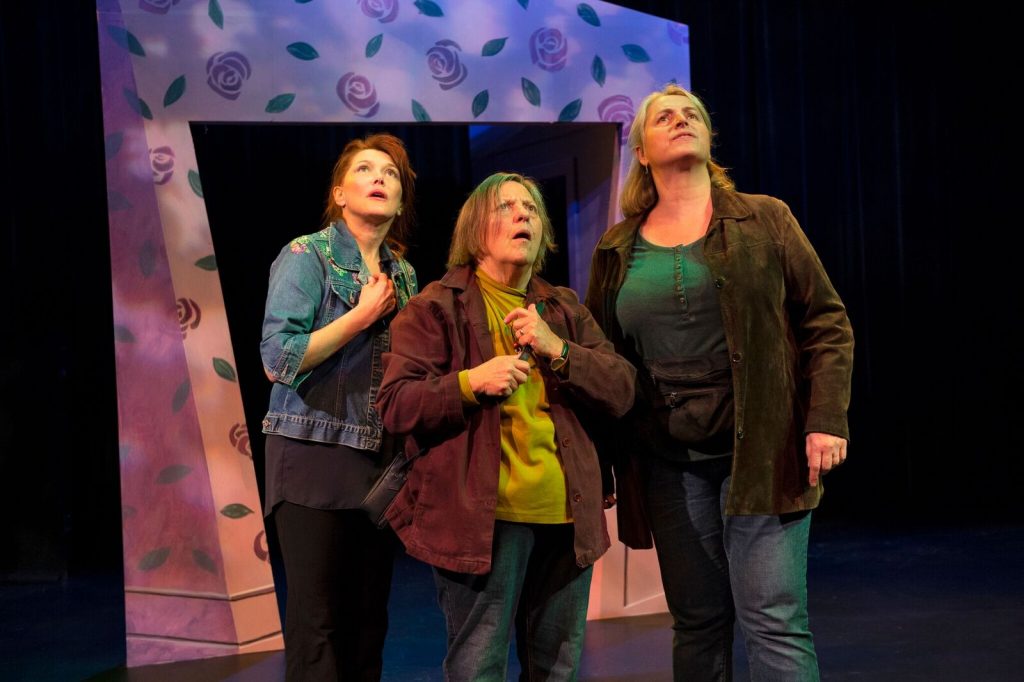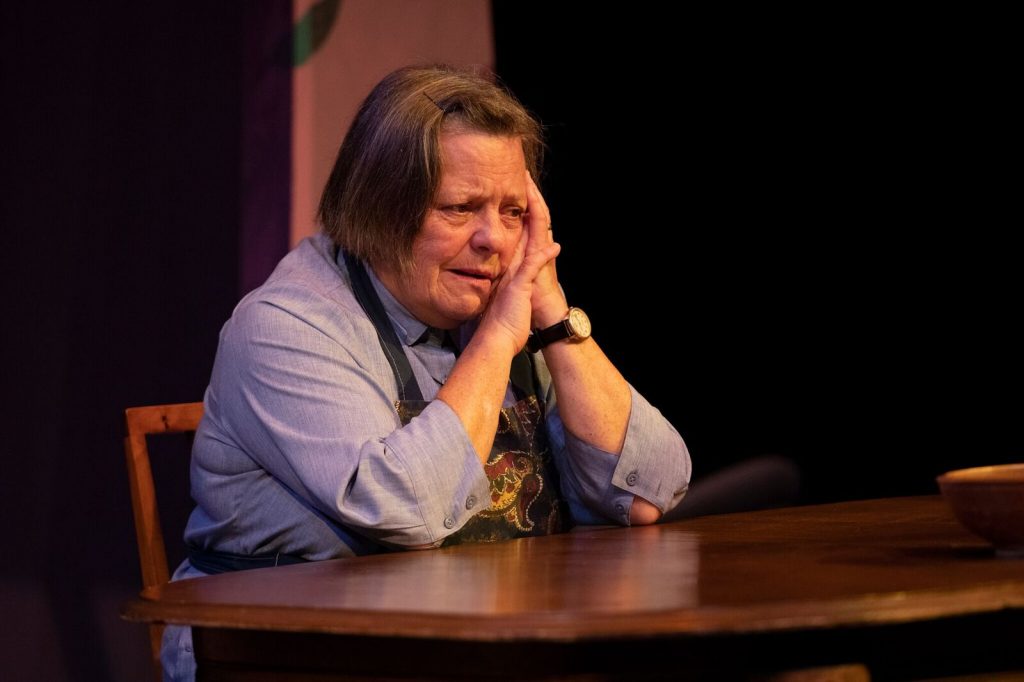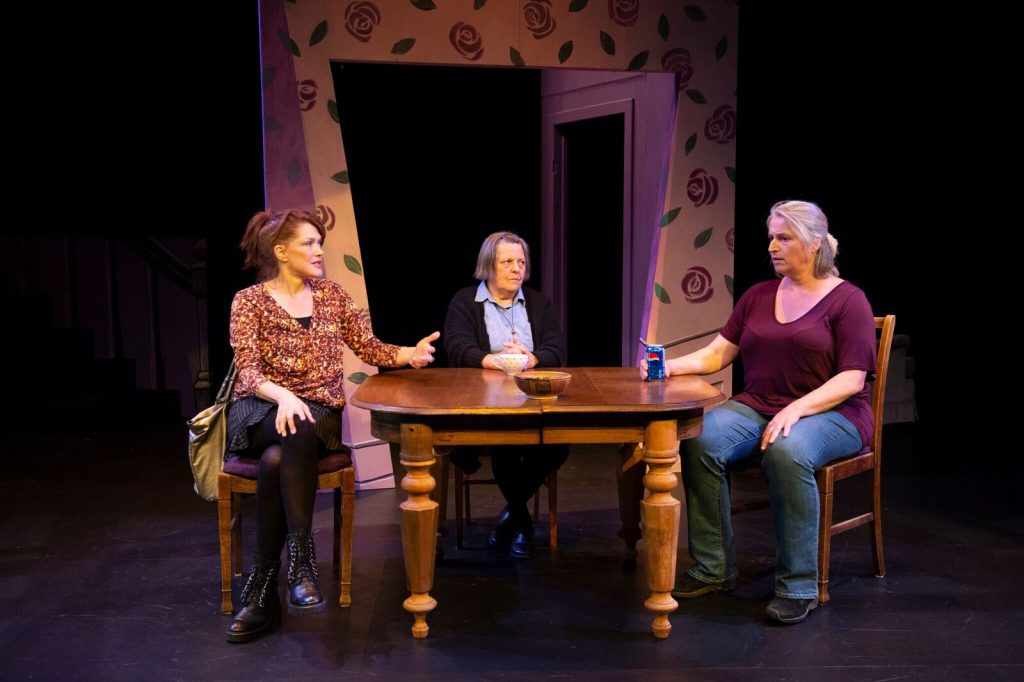
Credit: David Cooper
At the Kay Meek Centre until September 20, 2018
Tickets from $15 at 604-981-6335/kaymeek.com
Posted September 7, 2018
Nicola Cavendish, how do we love thee? The ways are too numerous to count. Remember her in Shirley Valentine? The night I attended, Cavendish cut her finger while peeling potatoes at the top of the show. She told us, “talk amongst yourselves”, left the stage to look for a Band-Aid. Returning, she said she was told there were supposed to be some in one of the kitchen cupboards on the set so she rummaged through the cupboard and came up, still bleeding, empty-handed. She left the stage again and came back with a bandaged finger. Without skipping a beat, she picked up where she left off. It was all we could do to refrain from a standing ovation five minutes into the show.
How wonderful was she in Michel Tremblay’s For The Pleasure of Seeing Her Again? Absolutely unforgettable is the image of Cavendish, as Tremblay’s own mother, ascending into the flies in a flower bedecked basket. And then there was the night she blew the two Hollywood hotties off the stage in The Vagina Monologues because she’s an actor not just another pretty face.

Credit: David Cooper
So it’s completely fitting that Cavendish chose Daniel MacIvor’s Marion Bridge to be her stage swansong. In this play, Cavendish takes her character Theresa on a journey from judgemental, grumpy and uptight to compassionate, funny, warm and wise – all qualities, and so many more, that Cavendish has excelled in portraying over the four decades of her career. Truly, she has made more Vancouver audiences laugh than any other single comedian.
Playwright MacIvor takes us to rural Nova Scotia where we meet sisters Theresa, Agnes (Lynda Boyd) and Louise (Beatrice Zeilinger) who have come together to sit watch at the deathbed of their mother. Agnes is an alcoholic, under-employed actress in Toronto with a flair for irony. Amongst her sisters during their childhood, Agnes was the “unconventional one”. Theresa is a nun-cum-farmer who loves getting her hands into the soil, what she calls, “the blood of the earth”. She was the “good one”. Louise was “the strange one”, socially awkward and, as an adult, addicted to the TV soaps.
They have secrets and, true to life, there are revelations when these siblings get together in the family home upon the imminent death of a parent whom we never see.
Each of the characters has an extended monologue at some point in the play and, at the top of their game, all three actors deliver with passion and panache. Boyd, who played Rose Doyle in CBC’s series Republic of Doyle, kicks it off with a remembered dream in which Agnes is drowning. Arguably, Agnes, Theresa and Louise are all drowning in unfulfilled dreams. Doyle, as the youngest, is physical – pacing, expending energy, gesturing dramatically. It seems, for a while, that the play is Agnes’s but as it progresses MacIvor turns his attention to each of the women.

Credit: David Cooper
Cavendish’s Theresa is solid, moves heavily as if carrying a heavy burden – which her monologue reveals she is. Always the “good” sister, Theresa questions a god who allows children to suffer and evil to be everywhere apparent in the world.
Louise seems to be keeping a dark, possibly sexual secret but, in a delightful twist, that secret is turned upside down. As Louise, Zeilinger lumbers around, seems not to quite ‘get’ anything but, nevertheless, has an almost childlike wisdom.
By curtain, Marion Bridge – the site of a failed family visit years ago – is a fairly equally-weighted three-hander.
Thoughtfully directed by Roy Surette, the play concludes – as we have all expected – like a big, warm hug. Along the way, however, it has had its angry moments, its twists and turns, humour, grief – the gamut of human emotions portrayed by three actors who know exactly what they are doing and are having a great time doing it.
As for Cavendish, it’s a great play to go out on. For us, we can begin grieving that we will not have the pleasure of seeing her again on stage. Directing? Writing? All that energy, passion and talent has got to go somewhere.

